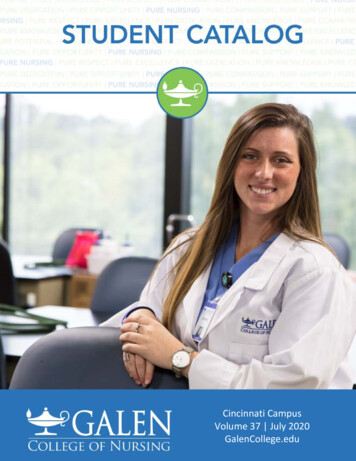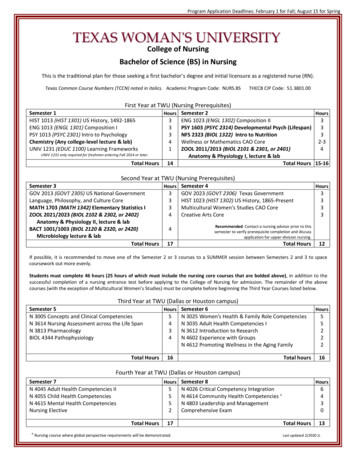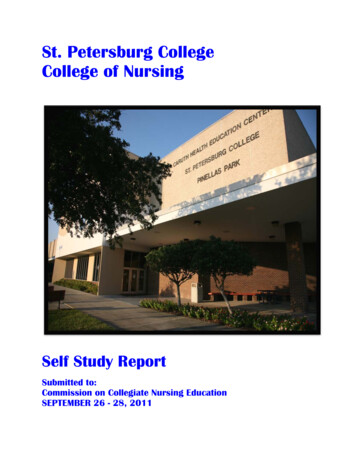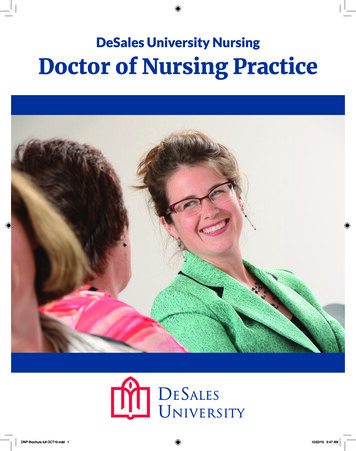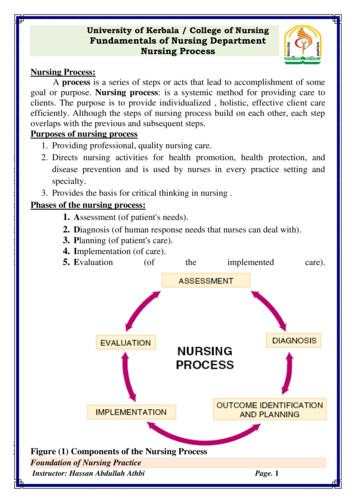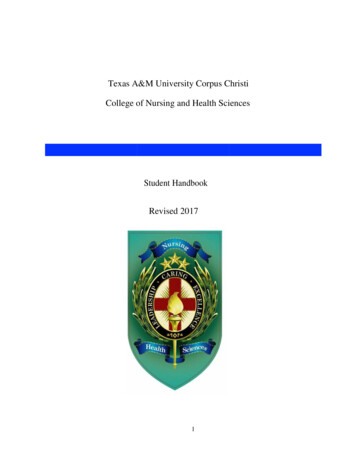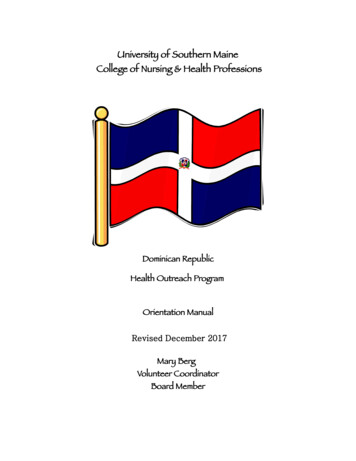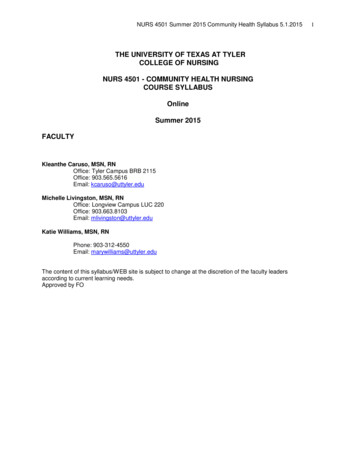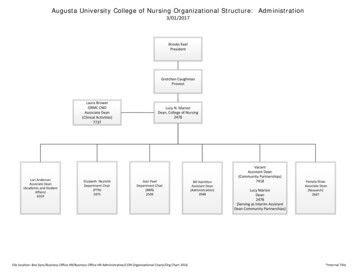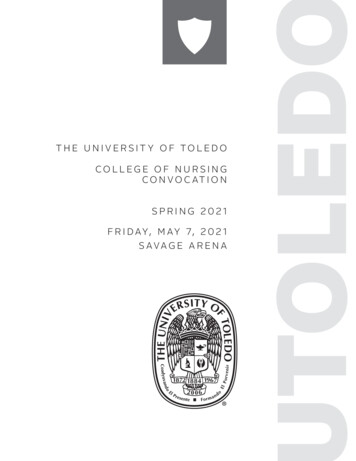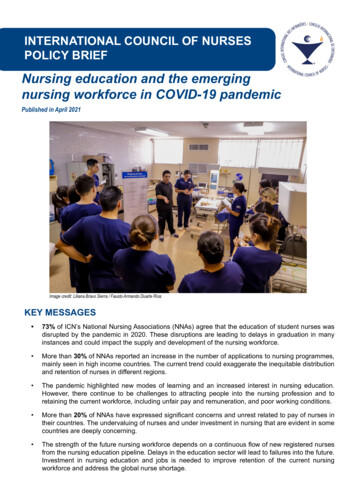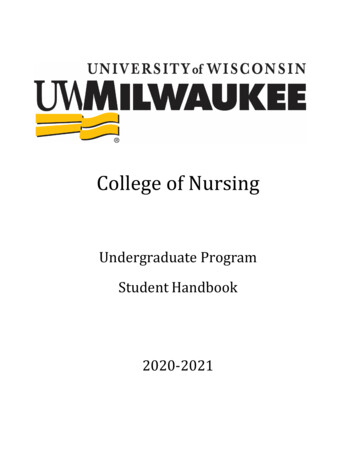
Transcription
College of NursingUndergraduate ProgramStudent Handbook2020-2021
UWM CON UG Student Handbook – 2020-2021COVID-19 Information for Students – UWM College of NursingThe following guidelines are intended for students enrolled in academic programs offeredwithin the College of Nursing. The safety of students and faculty within the College of Nursing isof the highest priority. Given that many of our students are also essential workers, everypossible precaution will be taken to allow students and faculty to be as safe as possible whilealso providing the highest quality educational experience.The UWM Emergency Operations Center Report is the main source of these guidelines. Thisreport can be accessed here: er-Report Final.pdfThese guidelines are categorized as:1) General guidelines,2) Guidelines when inside Cunningham (UW-Milwaukee) or Tallent Halls (UW-Parkside), and3) Guidelines when in class at off campus sites such as community agencies, schools, andhealth care facilities.General Guidelines Wash hands with soap and water for at least 20 seconds. Keep a supply of hand sanitizer. Do not touch your eyes, nose, or mouth with unwashed hands. Wear a covering to cover both the mouth and nose when indoors and anytime 6 feet ofdistance cannot be maintained. Cover your cough or sneeze. Clean all high touch areas at home and school. Avoid crowded areas. Keep six feet of distance between yourself and others. Ask yourself the screening questions before going to class on campus or into clinical andcommunity settings.COVID-19 Screening Questions People with COVID-19 have had a wide range of symptoms reported – ranging frommild symptoms to severe illness. Symptoms may appear 2-14 days after exposure tothe virus. Have you had these symptoms in this past timeframe?Yes No Symptom/ExposureFever or chills (100.4 F or greater)CoughShortness of breath or difficulty breathingFatigueMuscle or body achesHeadacheNew loss of taste or smellSore throat
UWM CON UG Student Handbook – 2020-2021Congestion or runny noseNausea or vomitingDiarrheaHave you been in close contact with others throughwork, home or the community who have testedpositive for COVID-19?(CDC, 2020) UWM students who have concerns about symptoms or potential exposure areencouraged to call Norris Health Center at (414) 229-4716 to speak with a medicalprofessional who can provide additional guidance. https://uwm.edu/norris/healthservices/Nursing students taking courses at UW-Parkside with concerns about symptoms orpotential exposure are encouraged to call UWP Student Health and CounselingCenter (262)595-2366 to speak with a medical enthealth/Communicate COVID-19 exposure or illness to your instructors as soon as possible.Instructors will work with the Program Director to develop a plan with the student.Stay home if you are sick.Guidelines When Inside Cunningham Hall The covering of the mouth and nose (such as a cloth mask) is required within CunninghamHall.o A mask may be removed when an individual is alone in their own office. It is extremely important, for infection control, that students not wear to campus clothingthat was worn in hospital or other health care setting where direct patient care isprovided.o Students who wear scrubs or white coats to campus are responsible for ensuringthey are clean before arriving to campus. If you are unable to clean scrubs or whitecoats prior to coming to class, please change into clean street clothing beforecoming to campus. Talk to your advisor about any concerns. Students will be provided, are required to wear, personal protective equipment (PPE)when attending classes where social distance cannot be maintained (e.g., healthassessment labs, psychomotor skills). Students and staff will monitor the flow of traffic to maintain six feet of distance whenentering and exiting rooms. The College of Nursing has a “if you touch it, you clean it" policy during simulations andskills in the College of Nursing. This is an important teachable activity for nursing studentsto understand potential transmission, infection control and prevention.Guidelines When in Class at Off Campus Sites Students will adhere to facility and unit specific requirements for symptom screening andPPE use. Students will follow any facility-based travel restrictions related to COVID-19.
UWM CON UG Student Handbook – 2020-2021Noncompliance will result in consequences including being denied entry to class, clinical, andimplementation of the Professional Expectations of Students in Academic and Clinical Settingspolicy (CP 05-01-17B)Please note that these guidelines are subject to changes as new information becomes availableto remain aligned with federal, state, and local public health recommendations. Students willbe notified directly of changes.
UWM CON UG Student Handbook – 2020-2021TABLE OF CONTENTSGeneral InformationGreetings from the UG Program Director1Philosophy of the College of Nursing2Vision, Mission, Core Values & Guiding Principles Statement3Admission Mission Statement4CON Organizational Charts5Problem Solving Hierarchy8Academic ProgramUndergraduate Nursing Program and Level Outcomes9Undergraduate Curriculum Concepts13Sample UWM Undergraduate Curriculum14Sample UWP Consortial Nursing Undergraduate Curriculum15Undergraduate Policies & Procedures Information16Students in the Nursing MajorExpectations of Students in the Nursing Major18Health, Safety & Clinical Practice Expectations for all Students19Student Requirements Before Beginning First Clinical Experience19Health and Accident Insurance19Physical Exam Requirements, including Health Record and Proof of Immunizations19Immunization Requirements20Infection and Bloodborne Pathogen In-Service21CPR Certification21Caregiver Background Check21Drug Test22Additional Safety Information23Undergraduate Student Uniform and Dress Code PolicyFamily Education Rights & Privacy Act (FERPA)24Letter of Recommendation Waiver Form27Health Insurance Portability and Accountability Act (HIPAA)2826Health and Safety IssuesInvasive Procedures29Guidelines on Acquired Immunodeficiency Syndrome (HIV/AIDS)29Protocol for Percutaneous Exposure to Body Fluids29Summary of UWM Policies31APA Style & Professional Writing34Student Support Services35
UWM CON UG Student Handbook – 2020-2021Accessibility Resource Center35Academic Enrichment Center35Email35Scholarship for Nursing Students35Student Afffairs Office36Nursing Learning Resource Center36Computer Lab36Student Participation in the College of NursingCollege of Nursing37Student Representation on Standing Committees37Student Organizations37Guidelines, Application, Agreement & Study forms for Independent Study39PoliciesBackground Checks Policy (CP 02-01-19)45Classroom and Clinical Policies (CP 05-02-17A)47Professional Expectations of Students (CP 05-01-17B)50Testing and Exams in Undergraduate Nursing Courses Policy (UPC 09-07-18A)61Undergraduate Progression and Appeals - Policy Statement (UPC 05-05-17(3)A)71This handbook includes pertinent information important to your progression in the professional major.
UWM CON UG Student Handbook – 2020-2021Introduction: Message from the UG Program DirectorWelcome to the University of Wisconsin-Milwaukee College ofNursing! It is a tremendous accomplishment to be admitted to theprofessional major, and we hope you are as proud of this achievement aswe are. I am truly honored to welcome you at the beginning of your journeyin professional nursing.Our curriculum is built on a set of competencies that identify theknowledge, skills, and clinical thinking that are needed by the professionalnurse. Our approach to teaching and learning is concept-based and studentcentered. Concept-based teaching emphasizes learning the processes of thinking and notsolely memorizing facts, though there is still core knowledge from pre-nursing courses andlearned throughout the nursing program that you will draw upon in order to becomeexcellent clinical thinkers. The term student-centered means that we use a wide variety ofexperiences, instructional approaches, and academic support strategies to address thelearning needs, interests, and backgrounds of our students.Active learning and opportunities to apply knowledge in a variety of clinical,classroom, and simulation experiences also play an important role in student learning andformation as a professional nurse. You will be challenged to apply previously attainedknowledge, analyze familiar and new situations, and to make clinical judgments based onevidence as you provide care for patients, families, and populations.What happens in college is not exactly the same as a career in nursing, but theknowledge, skills, and thinking we aim to help you develop are essential to your success as aprofessional nurse. The policies and procedures we use in the nursing program provide theopportunity to practice meeting the expectations for your career in nursing. These reflectwhat healthcare settings expect, so it would be a disservice if we expected any less from you,the future nurses of the world.This handbook has been designed to orient you to important information about theCollege of Nursing and the nursing program. It includes important procedures and policies.Take time to read through the handbook and become familiar with it. Ask questions ifsomething is unclear.Nursing is one of the most challenging majors at UW-Milwaukee. We are proud thatyou are here, and please know that we are committed to facilitating your success. Reach outto faculty, your curriculum coordinator, and/or your advisor when you need help. Get toknow your classmates - they will become your nursing colleagues. Make time to take care ofyourself.The faculty and I look forward to working with you!Warm regards,Melissa A. Brown, PhD, RN, CNEClinical Associate Professor and Interim Undergraduate Program Director1
UWM CON UG Student Handbook – 2020-2021Philosophy of the College of NursingConsistent with and evolving from the core values the following principles about human beings,environment, health, nursing, learning, and teaching guide the educational programs of theUniversity of Wisconsin-Milwaukee College of Nursing (UWM-Milwaukee, CON)1.Professional nurses are educated at a variety of curricular levels for generation, application, andevaluation of knowledge. The teaching-learning process is interactive. Learning requires activestudent participation and is enhanced when the instructional environment is respectful andsupports personal worth, dignity, and self-identity in the teacher and the student andencourages each person to grow and discover meaning.Each human is a unique, dynamic, integral being. Human beings exist within physical and socialenvironments. These environments are shaped by dynamic events in socio-cultural, natural,local and global political milieus. Actions of individuals and groups also shape theseenvironments that provide the context within which health and nursing systems operate.Nursing is committed to social justice, challenges existing paradigms when appropriate andcreates innovative solutions for health care problems.Nursing is a socially derived profession whose members assist person, families, groups and thelarger society to pursue the goal of optimum health. Health is a dynamic state influenced by theconstant interaction of internal and external factors. Health status is reflective of the well-beingof individuals and aggregates within environments and encompasses wellness, risks, problems,and needs that may be or have the potential to be present.Through the use of the nursing process, dynamic interactions between the nurse and the clientfacilitate the promotion, maintenance, or restoration of health. The knowledge base of nursingmust be continually developed and evaluated in response to changing environmental healthneeds. Nursing care is guided by professional standards and requires personal and professionalintegrity.Nursing, as a human interaction, is most effective when nurses reflect the population that itserves. The CON seeks to admit and educate a diverse student body in order to enrich thestudents’ educational experience and to prepare them to meet the health needs of a diversesociety. Therefore, a holistic review of applicants to the CON includes an evaluation of academicachievement, work and leadership experiences, personal and professional accomplishments,skills, abilities and personal qualities. Consideration of these factors as well as a wide range ofeconomic, social, racial/ethnic and geographic backgrounds will enhance diversity within theCON and the nursing profession.2
UWM CON UG Student Handbook – 2020-2021Vision, Mission, Core Values and Guiding PrinciplesVision StatementAs an innovative, academic, nursing community, the University of Wisconsin-Milwaukee Collegeof Nursing faculty, staff, students, and alumni are renowned leaders in creating bold andeffective solutions for advancing local, national and global health.2Core ValuesCollaborationCreativityDiversity & Inclusion ExcellenceIntegrityHuman DignitySocial JusticeWe, the University of Wisconsin-Milwaukee College of Nursing community, embrace anddemonstrate these core values in our learning, teaching, research, practice, and service.AccountabilityGuiding PrinciplesAs a diverse Community of Scholars that values passionate, academic discourse and debate in aclimate of civility, we live our core values and create opportunities to embrace, welcome,respect, and strive to understand the perspectives of others – colleagues, students,patients/clients, and community partners.As a CON community, we: live our core values;exhibit respectful, transparent and clear communication;expect and embrace shared accountability;appreciate and foster innovation; andseek collaboration in teaching, research, practice and service.Mission StatementThe University of Wisconsin-Milwaukee College of Nursing is a premier, urban, academic,collegial, nursing community that acts collaboratively with partners to: Prepare a diverse population of students to become science based, compassionate,nurse leaders through innovative, quality, educational programs for all settings andlevels of practice;Conduct research and scholarship that advance science in nursing and health;Address emerging health needs through evidence based practice and consultation; andDevelop leaders who transform health care delivery and health policy.1School of Nursing Faculty approved Faculty Document #(87-04)093 on April 3, 1987; 09/13/02 (ed.) CON Faculty approved Faculty Document#(87-04)083A on November 17, 2006.2Faculty Document #(96-09) 100 B, Revised May, 20123
UWM CON UG Student Handbook – 2020-2021Admission Mission StatementThe following Admission Mission Statement reflects the goals and values of the CON and guidesthe admission process:The undergraduate nursing program at the University of Wisconsin-Milwaukee is committed toadmitting diverse students who will become compassionate nurse leaders in creating bold andeffective solutions for advancing local, national and global health. Our admission process isguided by support for our core values of collaboration, diversity and inclusion, social justice,human dignity, integrity, creativity, accountability, and excellence. We will use attributes,experiences, and academic metrics in selecting students for admission consistent with ourmission as a premier, urban, academic college of nursing community.4
University of Wisconsin–Milwaukee College of NursingOrganizational Chart for 2020-2021Associate Dean forAcademic AffairsJennifer DoeringSecretaryAcademic Affairs Support StaffSusan Wolff (Admin Prog Specialist)Christopher Peters (Admin Prog Specialist)Kristen Swanson (Preceptor Coordinator)Raymond MacDonald (Sr Admin Specialist)Sonya Sharp (Univ Services Prog Assoc)Educational Design & TechnologySupportmLaura Bennett (Information Processing Consultant)Data ArchitectAmber DuChateau (Assoc Information Processing Consultant)Brian Lang (Information ProcessingConsultant)Student AffairsConsortial NursingProgramsNursing ProgramsNursing LearningResource Center(NLRC)5
University of Wisconsin–Milwaukee College of NursingOrganizational Chart for 2020-2021Nursing ProgramsUndergraduate ProgramsMelissa Brown (Clin Asst Prof) - UG Program Director (Interim)Nicole Simonson (Clin Instr)- Director of RN-BSN CompletionPrograms (Interim)Graduate ProgramsPaula Lucey (Clin Asst Prof) - MN Program DirectorLynne Woehrle (Assoc Prof) - MSP Program DirectorCarol Klingbeil (Clin Assoc Prof) - DNP Program DirectorJulia Snethen (Prof) - PhD Program DirectorUndergraduateProgram SupportAmy Amherdt (Sr Admin Specialist)BSN@Home:Sylvia Forbes (Outreach Program Manager II)Undergraduate ProgramCoordinatorsLisa Brennan (Clin Instr) - Curriculum (interm)Kylateia Farrar (Clin Instr) - NCLEXDeanna Harcarik (Clin Instr) - CurriculumDanielle Krueger (Clin Instr) - NCLEXJennifer McCulloch (Clin Instr) - Curriculum (interim)Mandy Sheriff (Clinical Asst Prof) - CurriculumGraduate ProgramSupportSue Wolff (Admin Prog Specialist) Support for MN, DNP & PhD Program DirectorsBridget Brown (Admin Prog Specialist) Program Coordinator for MSP ProgramLaura Hermanns (Admin Prog Specialist) Support for MSP ProgramBarb Zembles (Clin Instr) - Curriculum (interim)6
University of Wisconsin–Milwaukee College of NursingOrganizational Chart for 2020-2021Student AffairsRobin Jens - Assistant Dean of Student ServicesStudent Affairs Support StaffMichael Walk (Admin. Specialist) Office Manager-Lynn Helmke (University Services Assoc. II)Receptionist/Admin. SupportMatthew Halloran (Advisor) Recruitment CoordinatorAdvisorsBridget Brown (Admin. Prog. Specialist - MSP)Jennifer Daood (Sr. Advisor)Sylvia Forbes (Outreach Prog. Manager II)Nursing Study CenterEbony Cobb (Advisor) - CoordinatorTamara Griffin (Faculty Associate) Learning Specialist/TutorKatie Nack (Advisor)Connor Sampson (Advisor - Pre-Nurisng, MATC)Hillary Vara (Advisor - UWP)Donna Wier (Sr. Advisor)7
COLLEGE OF NURSING PROBLEM SOLVING HIERARCHYPlease Note: At any point during this process you may contact yourStudent Affairs AdvisorQuestion or concern about a course or related issueCheck the course syllabusCheck the course Canvas siteReview the Undergraduate Student Handbook andCanvas Policy and Procedure siteIf question or concern is not resolvedTalk with or make an appointment to meet with the course instructorIf question or concern is not resolvedContact the Curriculum CoordinatorIf question or concern is not resolvedContact College of Nursing Undergraduate Program DirectorIf question or concern is not resolvedContact the College of Nursing Associate Dean for Academic Affairs8
UWM CON UG Student Handbook – 2020-2021ACADEMIC PROGRAMUndergraduate Nursing ProgramThe graduate of the UWM College of Nursing is prepared to practice as a beginning generalist ina variety of settings. In addition, graduates will possess knowledge and skills that qualify themto pursue life-long learning and advanced study. The UWM College of Nursing undergraduateand graduate programs are directed toward enhancing the health of those who live and work inurban communities.The curriculum is built on a set of competencies and objectives (Table 1) that identify theknowledge, skills and attitudes that are needed by the professional nurse. Our competencybased curriculum is supported by a conceptual approach (Table 2) to teaching and learning.Table 1 Undergraduate Program Competencies and Level tered Care: Thegraduate will provide holisticcare that recognizespatients’* (individuals,families, groups, andcommunities) preferences,values, and needs andrespects patients or theirdesignees as full partners inproviding compassionate,coordinated, age andculturally appropriate, safeand eff
Nursing students taking courses at UW-Parkside with concerns about symptoms or potential exposure are encouraged to call UWP Student Health and Counseling Center (262)595-2366 to speak with a medical professional
